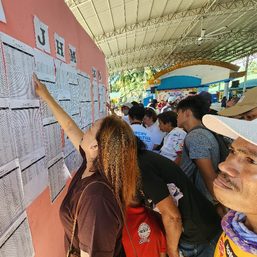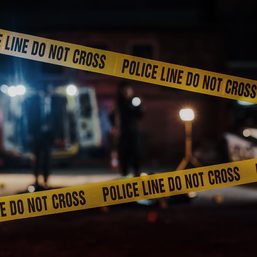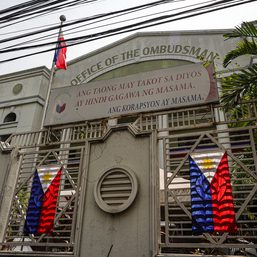SUMMARY
This is AI generated summarization, which may have errors. For context, always refer to the full article.
![[OPINION] Wag kukurap: Why anti-corruption should be on youth’s 2023 SK election agenda](https://www.rappler.com/tachyon/2023/04/sk-wag-kukurap-april-18-2023.jpg)
Comelec has finalized the schedule of activities for the 2023 Barangay and Sangguniang Kabataan (SK) Elections. Filing of COCs will happen from August 28 to September 2, 2023, and the campaign period will happen from October 19 to 28, 2023.
With the election calendar now set in stone, our aspiring SKs should start preparing their campaign platforms. Fighting corruption should be one of them.
Contextualizing (anti-)corruption in the Philippines
Corruption is a problem that has plagued our country for so long. It has been linked to underdevelopment, inequality, and poverty — affecting the lives of millions of Filipinos. For decades, many have tried and failed to curb this disease.
Under the Duterte administration, we enacted a Freedom of Information (FOI) policy (though only within the executive branch) and formed a Presidential Anti-Corruption Commission (PACC). Through Congress, we also enacted a new anti-red tape law to expedite government service delivery.
Obviously, corruption continues to haunt us. Transparency International’s 2022 Corruption Perceptions Index described the Philippines as one of the “significant decliners” in the Asia-Pacific — we ranked 116th out of 180 with a score of 33/100. In TRACE’s 2022 Bribery Risk Matrix, the Philippines’ score worsened indicating a higher risk of business bribery.
Even the COVID-19 pandemic didn’t serve as a deterrent. Corruption scandals swung back and forth: from multi-billion shabu smuggling to jail extortion, to overpriced procurement, to the perennial problem of vote-buying during the last 2022 elections.
Much work still has to be done. But these corruption scandals involve billions of pesos, government officials, and a lot of litigation — matters unrelatable and out-of-reach to the average person, more so the youth. With the SK elections fast approaching, what role can young Filipinos play?
Filipino youth, anti-corruption champions
The Filipino youth should stand front and center as anti-corruption champions.
The SK Reform Law (RA 10742) empowers young people to champion good governance through the SK and the Local Youth Development Councils (LYDCs). The Philippine Youth Development Plan even identifies governance as a key center for youth participation, envisioning “youth who uphold the principles of government practices which are efficient, effective, free from graft and corruption.”
When elected, SK officials will have the direct power to implement programs and influence how policies are shaped. As members of government, they have a unique opportunity to fight corruption from within.
Unfortunately, people still question corruption as a youth issue — including young people themselves. Some believe that there are more important youth issues to solve, that corruption only happens because of old traditional politicians, and that SKs are too powerless to lead any meaningful change.
On the contrary, here’s why corruption is a relevant youth issue and why anti-corruption should be in the youth’s election agenda:
First, corruption directly affects the youth
Young Filipinos face a myriad of problems — issues with education, physical and mental health, hunger, unemployment, and so on. The government bridges those gaps with programs and services like scholarships, learning subsidies, public health services, and livelihood training. But corruption prevents young people from enjoying these benefits.
Every peso pocketed by a corrupt official is a peso taken from a young Filipino. Because of corruption, we can’t subsidize more students’ education expenses. Without opportunities, it becomes more difficult for young people to get jobs. Medical assistance also becomes more out-of-reach. Without preventing corruption, the cycle of poverty, inequality, and abuse among young people continues.
It’s important that aspiring SKs commit against often-normalized corrupt practices and ensure that every peso counts for every young Filipino.
Second, corruption also happens in youth governance
A caveat to entering public office is that our SKs will also be exposed to corrupt practices, like kickbacks (or “SOPs”) in government projects and getting bribed to influence the decisions they make.
Years back, an SK National Federation President faced graft charges involving millions of pesos. Though the case was dismissed, this issue sparked discussions about how the SK had allegedly become a “breeding ground of corrupt and traditional politicians,” almost leading to its abolition.
These allegations can become more apparent today. After all, the SK Reform Law gives SKs the power to control and manage up to 10% of their barangay’s budget. A back-of-the-envelope calculation would show that they can end up managing (or mismanaging) at least P500,000 to P10 million annually (depending on their barangay’s budget).
Acknowledging the reality that corruption can happen with these resources under their control, it’s important that aspiring SKs commit to fighting corruption within their own ranks.
Third, the youth has the power to lead change
“Bagong SK” (New SK) is the brand that incumbent SK officials carried as a commitment to the SK Reform Law’s promise of genuine youth participation in governance. It is a direct challenge against the “Dating SK” (Old SK) which was plagued with issues of corruption, incompetence, and traditional politics.
Indeed, the first Bagong SK batch reignited a brand of youth leadership founded on important good governance and anti-corruption principles, especially transparency and accountability. Some SK officials committed to full disclosure policies, encouraged transparency in bidding and procurement, while others lobbied for local FOI ordinances in their LGUs (like the SK Federation of Calauan, Laguna.)
Anti-corruption initiatives don’t just come from elected youth leaders either — even youth in civil society do their part. San Pablo City, Laguna’s LYDC recently launched an “SK Watch” citizen watchdog initiative to monitor the performance and management of their SKs.
With Bagong SK already leading important anti-corruption work, aspiring SKs should continue their legacy. They should find inspiration from ongoing initiatives, adopt the best practices, and innovate.
Anti-corruption towards a culture of integrity
On October 30, 2023, we will elect over 300,000 new SK officials into local government. For three or more years, we will entrust to them not just government resources worth billions of pesos but also the responsibility of making an impact on the lives of millions of young Filipinos.
With this much at stake, we call on aspiring SK offiicials to highlight anti-corruption in their election agenda. They can start by promising to strengthen youth participation in governance (participatory budget planning, public bidding/procurement), to promote transparency (FOI ordinances, full disclosure policies), and to promote citizen-oriented accountability mechanisms (citizen watch programs).
We also call on youth constituents to start asking themselves: What kind of leaders will I vote for? Will they continue normalizing the culture of corruption, or will they replace it with a culture of integrity? Will they join a community of corrupt and traditional politicians, or will they join a community of anti-corruption champions and good governance advocates?
Though only time will give us answers, our future public servants’ commitment to fighting corruption is the first step towards building a culture of integrity. – Rappler.com
Dexter Yang is the founder of GoodGovPH, a youth-led non-profit for good governance. He also represents Southeast Asia in UNODC’s Youth-led Integrity Advisory Board to advise on youth engagement for anti-corruption. He is pursuing his Juris Doctor degree at the University of the Philippines College of Law.
Add a comment
How does this make you feel?
![[OPINION] We can make our government work better – and it starts in our barangays](https://www.rappler.com/tachyon/2023/02/imho-community-governance.png?fit=449%2C449)
![[OPINION] Tough times call for ‘flexible’ governance](https://www.rappler.com/tachyon/2023/11/Tough-times-call-for-flexible-governance.jpg?resize=257%2C257&crop=264px%2C0px%2C720px%2C720px)
![[OPINION] Political terrain in Taguig has shifted](https://www.rappler.com/tachyon/2023/11/binay-cayetano-taguig-november-22-2023.jpg?resize=257%2C257&crop_strategy=attention)



![[WATCH] Bamban POGO scandal: There’s a bigger fish than Alice Guo](https://www.rappler.com/tachyon/2024/07/inside-track-tcard-bamban-pogo.jpg?resize=257%2C257&crop=435px%2C0px%2C1080px%2C1080px)



![[OPINION] What kind of citizens are we?](https://www.rappler.com/tachyon/2024/07/tl-what-kind-of-citizen-are-we.jpg?resize=257%2C257&crop=333px%2C0px%2C1080px%2C1080px)
There are no comments yet. Add your comment to start the conversation.